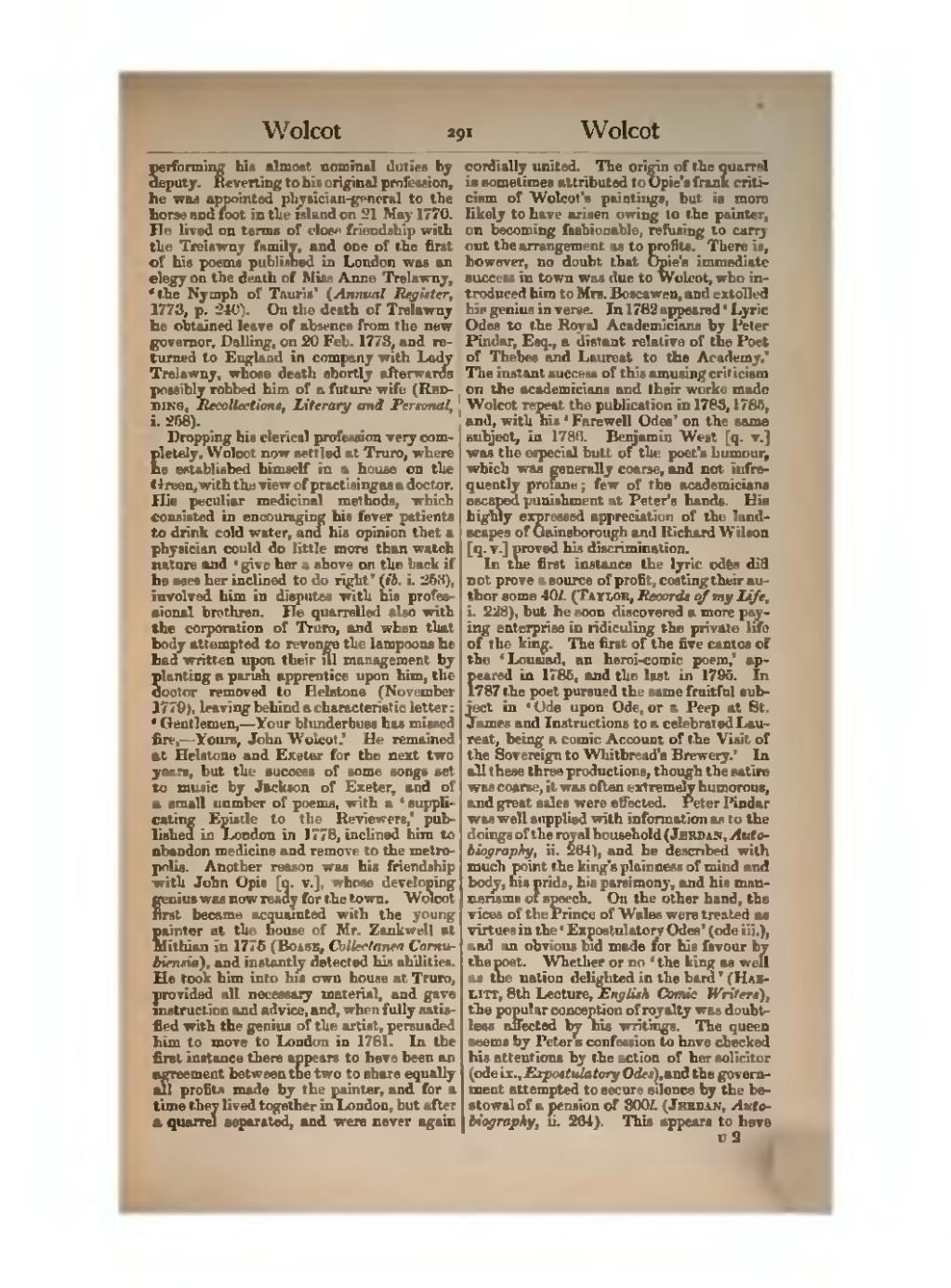performing his almost nominal duties by deputy. Reverting to his original profession, he was appointed physician-general to the horse and foot in the island on 21 May 1770. He lived on terms of close friendship with the Trelawny family, and one of the first of his poems published in London was an elegy on the death of Miss Anne Trelawny, ‘the Nymph of Tauris’ (Annual Register, 1773, p. 240). On the death of Trelawny he obtained leave of absence from the new governor, Dalling, on 20 Feb. 1773, and returned to England in company with Lady Trelawny, whose death shortly afterwards possibly robbed him of a future wife (Redding, Recollections, Literary and Personal, i. 258).
Dropping his clerical profession very completely, Wolcot now settled at Truro, where he established himself in a house on the Green, with the view of practising as a doctor. His peculiar medicinal methods, which consisted in encouraging his fever patients to drink cold water, and his opinion that a physician could do little more than watch nature and ‘give her a shove on the back if he sees her inclined to do right’ (ib. i. 253), involved him in disputes with his professional brethren. He quarrelled also with the corporation of Truro, and when that body attempted to revenge the lampoons he had written upon their ill management by planting a parish apprentice upon him, the doctor removed to Helstone (November 1779), leaving behind a characteristic letter: ‘Gentlemen,—Your blunderbuss has missed fire,—Yours, John Wolcot.’ He remained at Helstone and Exeter for the next two years, but the success of some songs set to music by Jackson of Exeter, and of a small number of poems, with a ‘supplicating Epistle to the Reviewers,’ published in London in 1778, inclined him to abandon medicine and remove to the metropolis. Another reason was his friendship with John Opie [q. v.], whose developing genius was now ready for the town. Wolcot first became acquainted with the young painter at the house of Mr. Zankwell at Mithian in 1775 (Boase, Collectanea Cornubiensia), and instantly detected his abilities. He took him into his own house at Truro, provided all necessary material, and gave instruction and advice, and, when fully satisfied with the genius of the artist, persuaded him to move to London in 1781. In the first instance there appears to have been an agreement between the two to share equally all profits made by the painter, and for a time they lived together in London, but after a quarrel separated, and were never again cordially united. The origin of the quarrel is sometimes attributed to Opie's frank criticism of Wolcot's paintings, but is more likely to have arisen owing to the painter, on becoming fashionable, refusing to carry out the arrangement as to profits. There is, however, no doubt that Opie's immediate success in town was due to Wolcot, who introduced him to Mrs. Boscawen, and extolled his genius in verse. In 1782 appeared ‘Lyric Odes to the Royal Academicians by Peter Pindar, Esq., a distant relative of the Poet of Thebes and Laureat to the Academy.’ The instant success of this amusing criticism on the academicians and their works made Wolcot repeat the publication in 1783, 1785, and, with his ‘Farewell Odes’ on the same subject, in 1786. Benjamin West [q. v.] was the especial butt of the poet's humour, which was generally coarse, and not infrequently profane; few of the academicians escaped punishment at Peter's hands. His highly expressed appreciation of the landscapes of Gainsborough and Richard Wilson [q. v.] proved his discrimination.
In the first instance the lyric odes did not prove a source of profit, costing their author some 40l. (Taylor, Records of my Life, i. 228), but he soon discovered a more paying enterprise in ridiculing the private life of the king. The first of the five cantos of the ‘Lousiad, an heroi-comic poem,’ appeared in 1785, and the last in 1795. In 1787 the poet pursued the same fruitful subject in ‘Ode upon Ode, or a Peep at St. James and Instructions to a celebrated Laureat, being a comic Account of the Visit of the Sovereign to Whitbread's Brewery.’ In all these three productions, though the satire was coarse, it was often extremely humorous, and great sales were effected. Peter Pindar was well supplied with information as to the doings of the royal household (Jerdan, Autobiography, ii. 264), and he described with much point the king's plainness of mind and body, his pride, his parsimony, and his mannerisms of speech. On the other hand, the vices of the Prince of Wales were treated as virtues in the ‘Expostulatory Odes’ (ode iii.), and an obvious bid made for his favour by the poet. Whether or no ‘the king as well as the nation delighted in the bard’ (Hazlitt, 8th Lecture, English Comic Writers), the popular conception of royalty was doubtless affected by his writings. The queen seems by Peter's confession to have checked his attentions by the action of her solicitor (ode ix., Expostulatory Odes), and the government attempted to secure silence by the bestowal of a pension of 300l. (Jerdan, Autobiography, ii. 264). This appears to have
